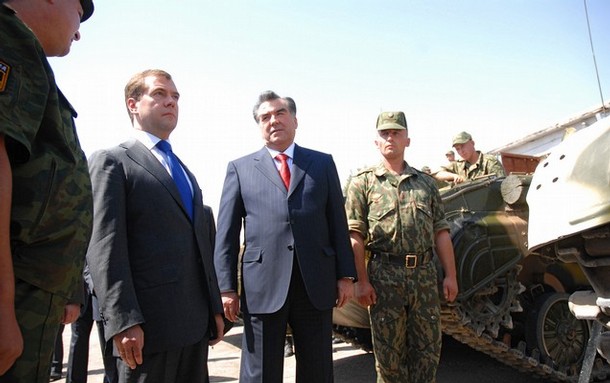
Russia Wants New Airbase in Tajikistan
Publication: Eurasia Daily Monitor Volume: 5 Issue: 221
By:

Speculation over the future of Ayni, which fell into disuse after the dissolution of the Soviet Union, has grown since India invested heavily in upgrading the runway and expanded hangers, which some thought was a precursor to the deployment of India’s air force in Tajikistan. There has, in fact, been considerable interest in the possible use of the facility, reportedly from the United States and NATO, particularly France. The French examined Ayni as an alternative to the capital Dushanbe for its Mirage fighter jets, which support antiterrorist operations in Afghanistan (Asia-Plus, October 29).
Tajikistan’s need to reach a new agreement on hosting the Russian air force emerged from the government’s decision in summer 2008 to demilitarize the capital. Currently, elements of the VVS are deployed in support of Russia’s 201st Motor Rifle Division at its base in Dushanbe. During a visit to Tajikistan on August 29, Russian President Dmitry Medvedev intimated that an agreement had been reached on the joint use of the airfield, with Russian construction work to complete the base before any later deployment. Despite this initial bilateral agreement in principle, it seems that the Russian defense ministry is haggling over the terms of the agreement to bolster Russia’s interests in the region. It may also be that having secured the joint use agreement in late August, the Kremlin is pushing for exclusivity at Ayni for geopolitical reasons, as Russia displays a more assertive foreign policy and positions itself for possible shifts in its relations with the U.S. and NATO after Barack Obama’s inauguration as President of the United States (Asia-Plus, October 30).
Predictably, Tajik officials and experts have been prickly about Russia’s intentions over Ayni. Tajikistan’s Ministry of Defense (MoD) denied that it was considering, or even discussing, giving Russia sole use of the base. “This is out of the question, because the airfield is still being upgraded,” the head of the Defense Ministry’s press service, Faridun Mahmadaliyev, said. “The agreement on the joint use of the Hisor [Ayni] airfield is the maximum that Tajikistan can and should do for Russia. As for the base, its ownership should not be handed over to anybody,” said Abdughani Mamadazimov, the chairman of the executive committee of the Tajik National Association of Political Scientists (Asia-Plus, October 30).
Meanwhile, exploiting its close links with the Tajik MoD, Russia’s defense industry has moved to secure a cooperative arrangement with a Tajik counterpart, which envisages joint use of the state enterprise Zarya Vostoka Plant (northern Tajikistan) for manufacturing defense products for export to third countries. On November 12 a session of a joint subcommittee for military-technical cooperation, part of an intergovernmental commission for economic cooperation between Tajikistan and Russia, explored deepening defense cooperation to upgrade or repair Russian-manufactured military hardware. Tojiniso Azizova, the head of the Tajik Energy and Industry Ministry’s press center, said:
The session’s agenda also includes issues of improving the regulatory and legal basis of military-technical cooperation; joint use of production facilities of the state unitary enterprise Zarya Vostoka Plant for manufacturing, modernizing, repairing, and disposing of military products; [and] settling debts incurred by training military and technical personnel for Tajikistan in military educational institutions of the Russian Defense Ministry. [Also discussed were] organizing the repair and modernization of Russian-made armored hardware, missile hardware, and artillery, with the involvement of Tajik enterprises (Asia-Plus, November 12).
Such cooperative ventures make the future deployment of additional Russian air force platforms within Tajikistan more likely, whether for sole or joint use.
It is clear that buoyed by Russia’s military victory in Georgia and despite the brief EU storm that followed, Russia’s foreign policy in its “near abroad” will continue to show signs of further projecting Russian power. The new base in Tajikistan looks set to become part of this unfolding process.




